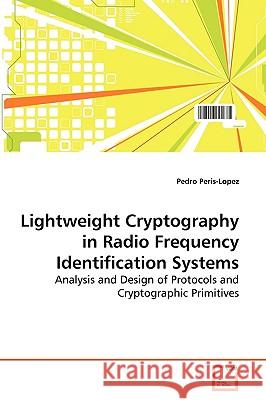Lightweight Cryptography in Radio Frequency Identification Systems » książka
Lightweight Cryptography in Radio Frequency Identification Systems
ISBN-13: 9783639108972 / Angielski / Miękka / 2010 / 260 str.
This thesis examines the security issues of Radio Frequency Identification (RFID) technology. First, we analyze the security of the EPC Class-1 Generation-2 standard. Secondly, we cryptanalyze two new proposals, showing their unsuccessful attempt to increase the security level of the specification. Thirdly, we propose a new protocol resistant to passive attacks and conforming to low-cost RFID tag requirements. Fourthly, we propose a new protocol resistant to both passive and active attacks and suitable for moderate-cost RFID tags. Finally, because this protocol is based on the use of cryptographic primitives and standard cryptographic primitives are not supported, we address the design of lightweight cryptographic primitives. Specifically, we propose a lightweight hash function (Tav-128) and a lightweight Pseudo- Random Number Generator (LAMED and LAMED-EPC).
This thesis examines the security issues of Radio Frequency Identification (RFID) technology. First, we analyze the security of the EPC Class-1 Generation-2 standard. Secondly, we cryptanalyze two new proposals, showing their unsuccessful attempt to increase the security level of the specification. Thirdly, we propose a new protocol resistant to passive attacks and conforming to low-cost RFID tag requirements. Fourthly, we propose a new protocol resistant to both passive and active attacks and suitable for moderate-cost RFID tags. Finally, because this protocol is based on the use of cryptographic primitives and standard cryptographic primitives are not supported, we address the design of lightweight cryptographic primitives. Specifically, we propose a lightweight hash function (Tav-128) and a lightweight Pseudo- Random Number Generator (LAMED and LAMED-EPC).











